|
|
|
Sort Order |
|
|
|
Items / Page
|
|
|
|
|
|
|
| Srl | Item |
| 1 |
ID:
086170
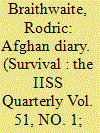

|
|
|
|
|
| Publication |
2009.
|
| Summary/Abstract |
In early September 2008 Rodric Braithwaite travelled to Afghanistan to 'see some of the places (Herat, Pandsher, Salang), talk to some Afghans, and check on the stories my Russian contacts (who go back there all the time) tell me about the positive attitude the Afghans now have towards the Russians'. He kept notes as a record for his own use, and to send back to his family on a daily basis to reassure them that he hadn't been kidnapped. He kindly shared them with Survival, and we present a version abridged to fit the available space. Braithwaite did not meet the kind of people that official visitors to Afghanistan usually meet. He drew a number of conclusions from his conversations:
First, the common belief among Afghans that they were better off under the Russians, and that the last Communist President Najibullah was a better leader than Karzai, may not reflect historical reality; but it bodes ill for the coalition's overall aims. Secondly, the Russian effort in Afghanistan was frustrated above all by their inability to control the frontier with Pakistan: a task which may well turn out to be even harder for the coalition. Thirdly, although the Russians were not defeated militarily in Afghanistan, any more than the Americans were in Vietnam, both the Russians and the Americans failed entirely to achieve their political objectives. The British, by contrast, who ended their nineteenth-century Afghan wars with military victory, sensibly settled for their minimum objective: a monopoly of Afghan foreign policy, which lasted for 80 years. There are no such simple options available today. Finally, there is no certainty that the proposed surge in coalition forces will stabilise the country: the analogy with Iraq is just as false as the earlier analogy between the prospects for democracy in Iraq and what happened in Germany and Japan after 1945.
|
|
|
|
|
|
|
|
|
|
|
|
|
|
|
|
| 2 |
ID:
086169
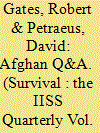

|
|
|
|
|
| Publication |
2009.
|
| Summary/Abstract |
My question is about Afghanistan. You described the challenges and some of the responses, but I would like you to go into more detail about what you expect other nations to contribute in military terms. Since I am a European, what would you expect European partners and allies of the United States to be contributing? More generally, what would you consider to be the appropriate balance, the appropriate policy mix, between the military surge on the one hand, and the political and economic efforts in Afghanistan and in the region on the other hand?
|
|
|
|
|
|
|
|
|
|
|
|
|
|
|
|
| 3 |
ID:
086163


|
|
|
|
|
| Publication |
2009.
|
| Summary/Abstract |
President-elect Barack Obama's announcement that closing the US detention facility at Guantanamo Bay, Cuba, would be among his priorities has raised hopes among Europeans. Reform of the detention system may be perceived as a first step towards the renewal of closer transatlantic ties, in line with the wider expectations of European governments and domestic publics towards the new US administration. Apart from the symbolic value, reform of US detention policy would also have the practical benefit of facilitating transatlantic cooperation in areas where it is most crucial: intelligence-sharing, transnational law enforcement and the conduct of multinational military operations.
European governments will also need to rethink their own approach to detention. Their reaction to US detention policies has encompassed both critical rhetoric and tacit acceptance (and sometimes assistance). These European governments have, however, not done enough to face up to the problem themselves.
|
|
|
|
|
|
|
|
|
|
|
|
|
|
|
|
| 4 |
ID:
086165


|
|
|
|
|
| Publication |
2009.
|
| Summary/Abstract |
The epidemic of piracy off the coast of Somalia since 2007 included the spectacular pirating in November 2008 of the Saudi supertanker Sirius Star containing a quarter of Saudi Arabia's daily oil production; the ship was released on 10 January 2009 in exchange for a $3 million ransom. The epidemic has led to extensive media commentary, a flurry of UN Security Council resolutions, and deployment of an unusual combination of some of the world's most powerful navies to escort commercial ships through one of the world's busiest, and now most dangerous, shipping lanes.
Predictably, policymakers, pundits and politicians have sought to harness the piracy story to advance their own agendas. Many have seized on it to plead for a durable political solution to the 19-year crisis of state collapse in Somalia. This is a waterborne variation on the 'securitisation' of state-building, the argument that failed states pose a host of spillover dangers, including piracy, if left unresolved. Humanitarians have contrasted the robust international anti-piracy response with the tepid global mobilisation to address Somalia's horrific humanitarian crisis, in which three million Somalis are in need of emergency aid. Some apologists have cast Somali piracy in 'Robin Hood' terms, as a legitimate local response by poor coastal fishing communities against external predators engaged in illegal fishing and toxic-waste dumping in their waters. More than a few journalists have framed the Somali piracy story as another example of 'Mad Max anarchy' prevailing in the hopelessly ungovernable place called Somalia. Still others warn that it is only a matter of time before the pirates fire on a ship laden with chemicals or fuel, producing an environmental disaster on Somalia's shoreline. And counter-terrorism experts have expressed concern over a 'terrorism-piracy nexus' in which some of the tens of millions of dollars of ransom money flowing into Somalia are being garnered by the al-Qaeda affiliate in Somalia known as al-Shabaab. What all of these perspectives share is the claim that Somali piracy is only a symptom of a much bigger political problem on land.
|
|
|
|
|
|
|
|
|
|
|
|
|
|
|
|
| 5 |
ID:
086166
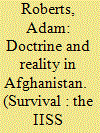

|
|
|
|
|
| Publication |
2009.
|
| Summary/Abstract |
The limitations of military doctrines and practice are often exposed, not by arguments, but by events. Thus it was mainly events in Iraq and Afghanistan that exposed the inadequacies of the so-called 'revolution in military affairs' - an idea that was popular in the United States from the mid 1990s until at least 2003. Now, Afghanistan - and the situation in Pakistan with which it is inextricably linked - is proving to be a harsh test of the revived ideas of counter-insurgency.
Afghanistan was always likely to be a difficult theatre of operations for outside military forces. Seeing this (and perhaps also because he did not want an ongoing distraction from the future invasion of Iraq, for which he was already lobbying), then-US Deputy Secretary of Defense Paul Wolfowitz said in November 2001:
In fact, one of the lessons of Afghanistan's history, which we've tried to apply in this campaign, is if you're a foreigner, try not to go in. If you go in, don't stay too long, because they don't tend to like any foreigners who stay too long.
|
|
|
|
|
|
|
|
|
|
|
|
|
|
|
|
| 6 |
ID:
086172
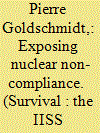

|
|
|
|
|
| Publication |
2009.
|
| Summary/Abstract |
The nuclear non-proliferation regime, so vital to maintaining international peace and security, is under increasing threat, particularly from countries that deliberately violate their non-proliferation obligations. Experience with North Korea and Iran has demonstrated that non-compliance must be addressed promptly and effectively. Iran has sought to exploit inconsistencies in how the International Atomic Energy Agency (IAEA) reports violations, including its own case and that of Libya, as well as the less worrying but still significant cases of South Korea and Egypt. Clarifying the technical and statutory basis by which the IAEA exposes non-compliance is one immediate way the non-proliferation regime can be strengthened.
|
|
|
|
|
|
|
|
|
|
|
|
|
|
|
|
| 7 |
ID:
086173
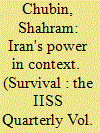

|
|
|
|
|
| Publication |
2009.
|
| Summary/Abstract |
Iran-US relations - strained at the best of times since the 1979 Iranian revolution - have never been worse than during the past six years, due to the much more intense interaction between the two states since the revelations about Iran's nuclear ambitions and the United States' invasion of Iraq. The United States sees Iran as a potential strategic rival, while Tehran views the American presence in the Middle East as a potential existential threat. This has led to zero-sum thinking and has raised the stakes correspondingly. In the process there has been an inflation of the Iranian threat, which is poorly understood and often exaggerated. Depicting Iran as a military threat obscures the real political threat the country poses to its region; Iran's regional behaviour has been neglected and overshadowed by the contentious nuclear issue. However, it is precisely Iran's behaviour and goals which feed concerns about its nuclear ambitions.
It is important to put the Iranian threat in context. In recent years, what was largely a bilateral rivalry between Iran and the United States has become displaced and expanded throughout the region: Palestine, Syria, Lebanon, Iraq and the Gulf states have all been affected by the growing tension, and there are signs that Iranian influence is becoming stronger in these areas. Iran's more active and effective diplomacy in the Middle East is due to the conjunction of three separate trends, all of which are reversible. The first is the emergence of a permissive regional environment, hospitable to Iran's diplomacy; the second, the ascension of an ideological and hardline conservative government in Tehran, predisposed to a more activist diplomacy; and third, the oil windfall, which freed resources for seeding movements and clients supportive of Iranian goals. However, the influence that has accrued to Iran as a result of these trends is transitory and precarious, and there are constraints on Iran becoming a regional superpower.
|
|
|
|
|
|
|
|
|
|
|
|
|
|
|
|
| 8 |
ID:
086174


|
|
|
|
|
| Publication |
2009.
|
| Summary/Abstract |
Most infectious diseases do not attract heightened political attention because their effects are mild, they are familiar to physicians, or their geographic occurrence is limited. A particular disease might be deemed a security issue, however, when its effects impose or threaten to impose an intolerable burden on society. That burden can be measured in terms of morbidity and mortality, but also in terms of the way in which a disease is perceived by those who fear infection. The disease described by the World Health Organisation (WHO) as 'the most feared security threat' today is pandemic influenza.The next pandemic could cause illness and death on a large scale, over a wide area, in a short space of time. Such a prospect arguably sets this disease apart from the many others that may be regarded simply as health issues, and some Western governments have started to frame pandemic influenza as a threat to national security. According to the US pandemic plan, a 'necessary enabler of pandemic preparedness' is that this be viewed 'as a national security issue'. The 'National Security Strategy of the United Kingdom' assesses an influenza pandemic as the 'highest risk' civil emergency. And under the Australian pandemic plan, which emphasises 'maintenance of social functioning', Australians are to receive the best possible health care 'commensurate with the maintenance of a safe and secure society'.
|
|
|
|
|
|
|
|
|
|
|
|
|
|
|
|
| 9 |
ID:
086164
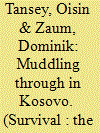

|
|
|
|
|
| Publication |
2009.
|
| Summary/Abstract |
Kosovo's unilateral declaration of independence of 17 February 2008 has made visible the deep divisions between the United States and its European allies on the one hand, and Russia on the other; divisions that shaped the political dynamics of the Kosovo crisis nine years ago as they do today. The failure to settle the status question through diplomacy has thrown the UN into crisis, leaving the Security Council deadlocked and the international community in Kosovo without direction and momentum. It has led to the de facto partition of Kosovo and control by Belgrade of the Serb-inhabited northern municipalities, and left the international community struggling to define the nature of its engagement. The political divisions that have heightened the problem in Kosovo over the last nine years are unlikely to be resolved soon and, if anything, recent developments have accentuated them. New and creative approaches to stabilising Kosovo and promoting its economic and institutional development are necessary. Current European Union projects in support of the peace process in Northern Ireland might offer a model for such engagement.
|
|
|
|
|
|
|
|
|
|
|
|
|
|
|
|
| 10 |
ID:
086171
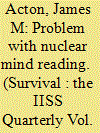

|
|
|
|
|
| Publication |
2009.
|
| Summary/Abstract |
The basic technologies that underlie nuclear power were first developed during the Second World War by the United States for purely military purposes. Since then, extensive civilian research and the use of nuclear technologies for peaceful ends has not erased this military heritage. Almost all nuclear technology in use around the world today is 'dual use', able to contribute to the production of fuel for nuclear reactors or the explosive components of nuclear weapons. For this reason, there is serious concern that supposedly peaceful nuclear programmes are being used for, or could become, cover for the development of nuclear weapons.
|
|
|
|
|
|
|
|
|
|
|
|
|
|
|
|
| 11 |
ID:
086168


|
|
|
|
|
| Publication |
2009.
|
| Summary/Abstract |
The situation in Afghanistan has turned so far against the United States, NATO, the international community, and those Afghans who originally hoped that the post-11 September 2001 intervention would finally bring them a chance for normal lives, that it will be very difficult to salvage. Al-Qaeda has established a new safe haven in the Federally Administered Tribal Areas of Pakistan, from which it supports insurgencies in Afghanistan and Pakistan and continues its global planning against the United States and its allies. Its press releases are so frequent that they are hardly newsworthy unless they feature video of Osama bin Laden himself. Negative trends in Afghanistan include the deterioration of security, Afghan governance and regional stability. The stability of Pakistan, a nuclear-weapons state that has been the main source of proliferation over the past two decades, is now at serious risk. Rising India-Pakistan tensions further exacerbate the regional risk, as do tensions over Iran's nuclear programme and its relations with Hizbullah and Hamas.
The task in Afghanistan would have been difficult under any circumstances. The Bush administration's unique record of incompetence, fecklessness and criminality has assured that the Obama administration inherits its responsibilities under the worst possible circumstances, not only in the region, but globally as well. Still, as President Obama's chief of staff Rahm Emanuel said of the economic situation, 'You never want a serious crisis to go to waste'.
This serious crisis may finally force equally serious thinking about the goals of the international intervention in Afghanistan and the means required to have any serious hope of attaining or approaching them. Rather than proclaim objectives limited only by the audacity of our imaginations (an Islamic democratic, stable, gender-sensitive and prosperous Afghanistan) and the paucity of our means (fewer resources per capita than any other such operation), we need to align objectives with reality, and means with objectives.
|
|
|
|
|
|
|
|
|
|
|
|
|
|
|
|
| 12 |
ID:
086167


|
|
|
|
|
| Publication |
2009.
|
| Summary/Abstract |
Because of the importance attached to military operations to destroy al-Qaeda, Pakistan is often viewed in the context of Afghanistan. As a result, events in Pakistan are usually assessed in terms of their effect on US objectives for Operation Enduring Freedom and on the operations of NATO's International Security Assistance Force. Their implications for Pakistan as a whole have been neglected and sometimes poorly analysed. But the well-being and stability of Pakistan is of supreme importance in its own right. This importance needs to be reflected in a sound and coherent strategy towards the country. The formulation of such a strategy requires an informed understanding of Pakistan's history; social, political and economic dynamics; and key personalities and influences. And the strategy needs to be underpinned by resources which are commensurate with the importance of the interests to be protected and advanced. Unfortunately, the customary means of acquiring real-time knowledge of events and personalities - diplomacy, media, commercial and other contacts - have been and still are impeded by the hazardous security situation in much of the country. Without a good understanding, actions taken for tactical purposes may have negative strategic consequences which outweigh the hoped-for benefits, as has occurred on several recent occasions.
The challenges in southwestern Asia need to be considered in three separate but related contexts: Afghanistan, the Afghan-Pakistani tribal belt, and Pakistan. In the present conjuncture, Pakistan is arguably the most important of the three. With nuclear weapons and a huge army, a population over five times that of Afghanistan, and simultaneous security, political and economic crises, it now seems less able, without outside help, to muddle through its challenges than at any time since its war with India in 1971.
|
|
|
|
|
|
|
|
|
|
|
|
|
|
|
|
|
|
|
|
|